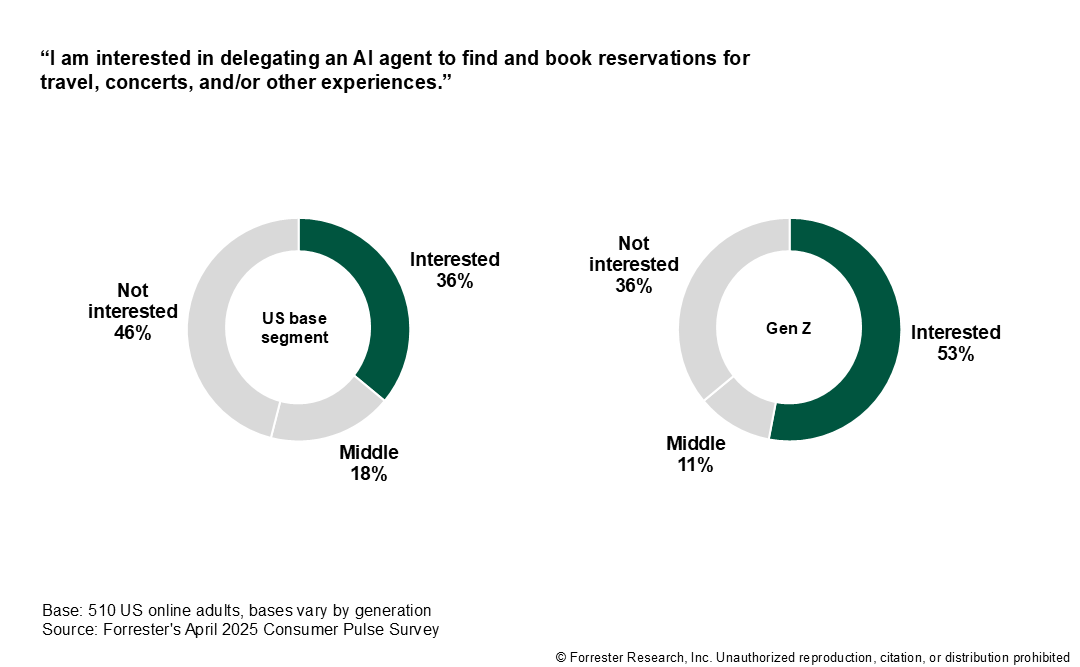As Consumers Turn To Agentic AI Use Cases, Businesses Must Adapt Or Be Left Behind
When we published our report, The Age Of Agents — GenAI-Fueled Virtual Assistants Will Fundamentally Change Digital Interactions, in 2023, we were watching the rise of generative AI and looking around the corner, noting that AI agents will reduce consumer friction and change how consumers engage with digital businesses. Two years later, agentic AI is one of Forrester’s top emerging technologies. Meanwhile, consumers are going all in on various genAI applications (one of our family members has an ongoing thread with ChatGPT to help him rehab a sports injury). While agent-based scenarios are newer, consumers are starting to pay attention. In a recent Consumer Pulse Survey we conducted, 36% of US adults said that they would be somewhat or very interested in delegating an AI agent to find and book reservations for travel, concerts, and/or other experiences. That shot up to 53% when looking just at US adults who are part of Generation Z.

For consumer-facing businesses, this means that:
- Proven digital strategies will be challenged. Marketplace business models will struggle to aggregate more than a consumer agent. Price discrimination will be quickly identified and not tolerated. Comparison services will have a hard time remaining relevant when agents can review consumer-specific criteria and make specific recommendations in no time.
- CX will increasingly equal “agent experience.” Good CX is going to require good agent experience for an increasing share of online consumers. Consequently, the “psychology of CX” will change when agents enter the fold. Contrary to humans, they won’t be susceptible to habit-creating features, gamification, or gimmicky loyalty programs.
- Client relationships will shift. Agents are poised to become the main user interface for those who use them. Curation and personalization will be provided by the agent, not businesses, while most client data will remain with the agent.
- Domain-specific agents will be rejected. Several consumer-facing businesses are building their own proprietary “shopping agents.” But the power of consumer agents lies in access to holistic consumer data. A personal agent will always outperform a domain-specific corporate agent in gathering deep client insight, driving far superior personalization and curation.
For Security And Fraud Teams, It’s No Longer As Simple As “Bot Or Not”
Security, fraud, and e-commerce teams have adopted bot management tools to distinguish automated traffic from human traffic, block the bad bots, and let in the good bots and the humans, while also sometimes throttling good bots during business-critical events such as flash sales. This gets more complicated with agents, which might look like bots but will have a specific human being’s intent behind them. The line between human and automated has never been blurrier. Look for bot management offerings that quickly adapt to analyze agent traffic and determine intent to give businesses the information they need to prioritize that traffic appropriately.
Digital And Security Teams Must Collaborate To Optimize Revenue And CX
Cross-team collaboration will be more important than ever. Security, fraud, digital, and marketing teams must work together to determine how to manage and prioritize the combination of good agents, bad agents, good bots, bad bots, good humans, and bad humans now gracing their digital storefronts. This discussion will require nuance. If agents always manage to cut the line ahead of humans trying to access the site directly, then human consumers could get frustrated and go elsewhere, a scenario that has long been an issue in the bot world. Always blocking or slowing down agents, however, will frustrate the humans behind them, such as the 53% of US Generation Z consumers interested in delegating agents for travel, concerts, and experiences. Blocking agents will send those consumers elsewhere. Therefore, teams will have to work closely to develop agent interaction strategies that prioritize their business’s target consumers and improve CX for them.
Later this year, we will be publishing additional research on the topic, including some more data points on consumer attitudes toward agents. In the meantime, we invite Forrester clients to set up an inquiry or guidance session to discuss this further.
